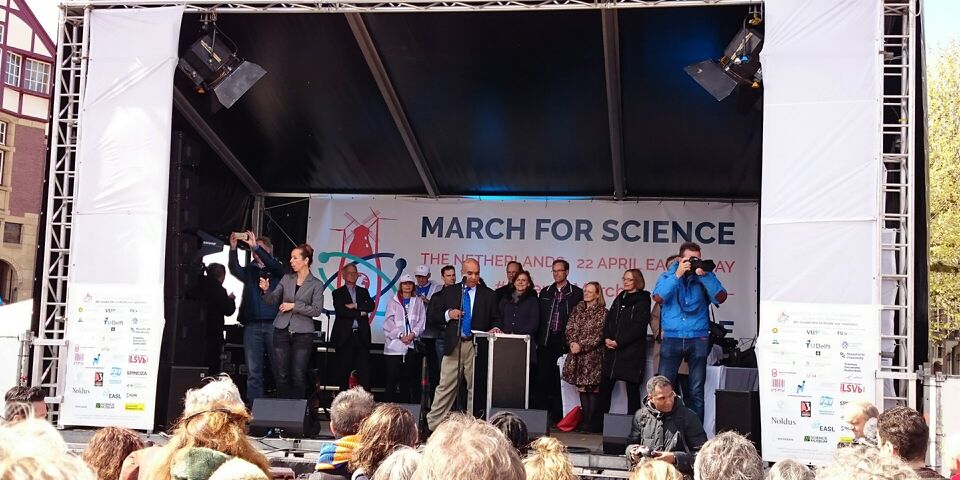“I am marching for science and knowledge. Will you march with me?”
In more than 600 cities across the world people marched last Saturday for science. One such place was Amsterdam's Museum Square, where an estimated 3000 people gathered to show their support during the March for Science. The result was a mini-festival that drew to a close with a walk round the pond.
“No democracy without science!” The message is loud and clear on the stage just a stone's throw from the Rijksmuseum. While close by tourists are having their pictures taken with the towering 'I Amsterdam' logo, the gathered demonstrators listen - some armed with boards sporting creative texts - to a series of speakers from every realm of science.
One of the most passionate is Peter Haagoord, director of Nijmegen's Max Planck Institute for Psycholinguistics. To great acclaim, he quotes a legendary call by trade union man Herman Bode, from 1980: “Do we want to go to Dam Square? Then we will go Dam Square!”
Nonetheless the atmosphere during the March for Science is more like that of a festival to celebrate science than a protest by angry demonstrators. Those present can pop into one of the two tents where scientists, standing in front of posters, are presenting their research. The youngest visitors (aged from two to six years old) are doing experiments in the Exploration Tent, and the KNAW is present with its own ice cream stall and information stand, staffed by director José van Dijck herself.
While no prominent figures from Eindhoven take the stage, as one of the institutions supporting the march, TU/e's logo is clearly visible. First-year TU/e student Joline Frens is present - the daughter of instigator Maarten Frens and recently to be seen distributing flyers on campus in Eindhoven.
She is enthusiastic about the outcome and relates that the turnout is estimated by 'security' to be 3000 people. “It is really cool to see that so many people have come along. There is such positive energy here. It is great that scientists have come out of their labs to stand up for what they believe in. I think this is the start of a movement.”
As is often the case, the bilingual nature of Saturday's program - alternately Dutch and English - feels a little uncomfortable, especially given the strong presence of internationals among the public. They are served by, among other features, a speech by Adeola Enigbokan, lecturer of Urban Sociology at the University of Amsterdam. She compares the March for Science with the colonial exhibition held at Museum Square at the end of the nineteenth century. Social sciences, she claims, have helped bring about great progress in the relationships between different cultures.
In the last session, the stage is taken by rectors and science administrators like Karl Dittrich (VSNU) and Jet Bussemaker (outgoing Minister of Education, Culture and Science). Bussemaker stresses that it is good that organizations like NWO and the KNAW - which as advisory bodies wanted to steer clear of organizing the march - are a prominent presence. “We must be critical of opinions that underestimate the value of science,” she emphasizes.
But most applause is generated by the at times emotional speech given by Vinod Subramaniam, rector of the Vrije Universiteit Amsterdam. “I am marching for science and knowledge,” he states with strong conviction. “Will you march with me?”
To the Dam is not where this first March for Science heads. But in response to an appeal by Subramaniam there follows a ‘science stroll’ round the pond on Museum Square, where it is evident that the turnout is sufficient to encircle the water with a broad ribbon of science supporters.


Discussion